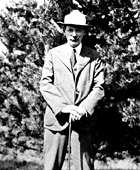On December 22nd, 1869, Edwin Arlington Robinson was born to Edwin Robinson and Mary Elizabeth Palmer in Head Tide, Maine. Growing up he lived in a town on the Kennecbec River called Gardiner, Maine. In a lot of his later poetry he bases a fictional town, Tilbury Town, on Gardiner. His family, which also consisted of two other brothers, lived moderately on his father's income, who worked as an important timber merchant. Robinson started seriously writing poetry at age 11, and was a talented writer for someone his age.
Despite his father's wishes, Robinson attended Harvard for two years, but had to leave because his family's money was running short. In 1892 his father died, resulting in Robinson and his family becoming quite poor. Later in 1896 his mother died of a serious illness. Some of Robinson's poetry grew from these unfortunate incidents.
After leaving Harvard, Robinson moved to New York City, and lived in Greenwich Village, in a house where many other artists and writers had once lived. He was very poor during this time, and didn't have much to support himself at all. He could basically carry all of his worldly possessions in one backpack.
In the 1890's he began to publish some of his poetry, mostly with the help of some of his friends. His first two books were "The Torrent and the Night Before" and "The Children of the Night" (based on the death of his mother). His third published book was "Captain Craig", and his forth was "The Town Down the River", which former President Theodore Roosevelt helped to get published.
Robinson, at the time, was working underground inspecting construction when Roosevelt discovered him. Roosevelt liked Robinson's work, and helped him to get a clerkship in the New York City Customs House. At this job, Robinson made enough income to support himself, and was able to devote most of his time to writing poetry. From this time on, Robinson's money problems were over.
After 1911 Robinson spent his summers in New Hampshire, and spent much time writing and publishing his poetry. By this time his books supported him for the rest of his life.
During his lifetime, Edwin Arlington Robinson won three Pulitzer Prizes for his poetry. The first time was in 1922; "Collected Poems" won his first Pulitzer. In 1925, he won his second for "The Man Who Died Twice". And he won his final Pulitzer in 1928 for "Tristram". During the 1920's he was often called "The Greatest Living American Poet", and later in his life was hailed the foremost figure of "New Poetry". Even though Robinson mostly wrote about traditional things (some being days of his old hometown, and King Authurs Court), nothing new or experimental, he still was considered a legend after his time.
Robinson died on April 6th, 1935 in New York City. By this time all his immediate family had died. He wrote many popular and great poems during his days, some of these are: "Merlin", "Lancelot", "Richard Cory", "Miniver Cheevy", "Mr. Flood's Party", "For a Dead Lady", and "Luke Havergal". |






